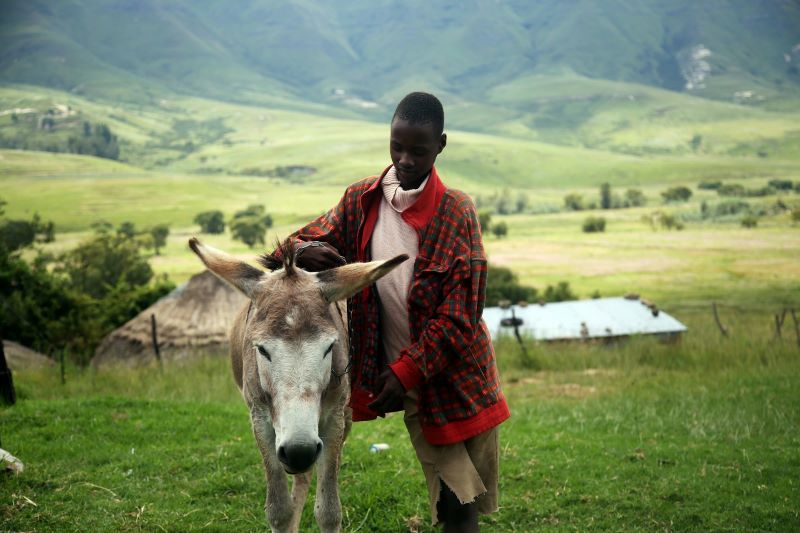Fighting HIV in Lesotho
 Lesotho, a small country in southern Africa, is making notable progress in tackling HIV and addressing the poverty it creates. With an HIV prevalence rate of approximately 24.6% among adults aged 15-49, Lesotho faces one of the highest infection rates globally. This epidemic continues to impact the country’s economic and social development. Through innovative programs and global partnerships, Lesotho shows that progress is achievable and impactful.
Lesotho, a small country in southern Africa, is making notable progress in tackling HIV and addressing the poverty it creates. With an HIV prevalence rate of approximately 24.6% among adults aged 15-49, Lesotho faces one of the highest infection rates globally. This epidemic continues to impact the country’s economic and social development. Through innovative programs and global partnerships, Lesotho shows that progress is achievable and impactful.
Universal HIV Treatment: Lesotho’s Test and Start Policy
In April 2016, Lesotho became the first country in sub-Saharan Africa to implement the “Test and Start” policy, which offers antiretroviral therapy (ART) to all HIV-positive individuals regardless of their CD4 count. This approach ensures early intervention, preventing the virus from progressing and reducing transmission rates. As of 2020, approximately 273,000 adults living with HIV in Lesotho were receiving antiretroviral therapy (ART), representing about 84% of the total HIV-positive adult population. Community-based testing initiatives have also played a key role. These programs bring services to rural areas through mobile clinics and health workers, enabling more individuals to know their HIV status and connect with treatment. Such efforts are vital in addressing HIV in Lesotho.
Advancing HIV Care Through Global Partnerships
International partnerships and government initiatives have significantly contributed to Lesotho’s HIV response. For the fiscal year 2024/2025, the Government of Lesotho allocated 233 million Maloti (approximately $15 million) for antiretroviral therapy (ART) procurement, demonstrating its commitment to a sustainable HIV response.
In 2022, PEPFAR contributed $75 million to support Lesotho’s HIV/AIDS response. This funding has been crucial in providing resources for HIV testing, prevention, and treatment, helping the country make significant progress toward achieving its UNAIDS 95-95-95 targets
These combined efforts, along with support from organizations like the Global Fund, have helped Lesotho progress toward the UNAIDS 95-95-95 targets. By 2020, 94% of people living with HIV in Lesotho knew their status. Additionally, 91% were receiving treatment, and 98% of those on treatment achieved viral suppression.
Using Technology to Improve HIV Care
Lesotho’s use of technology is revolutionizing HIV care and improving treatment outcomes. Electronic medical records (EMRs), implemented across healthcare facilities, improve patient tracking and continuity of care. For instance, HIV-positive pregnant women benefit from care recorded in EMRs linked to national health systems, ensuring more efficient service delivery.
Mobile health (mHealth) interventions, such as text message reminders, have also improved treatment adherence. A study in Lesotho found that patients receiving SMS reminders for medications and appointments demonstrated a 20% increase in adherence rates.
Digital tools have further enhanced public education campaigns, raising awareness about HIV prevention and reducing stigma. Mobile platforms ensure critical information reaches even the most remote communities.
Empowering Lives Through Comprehensive Care
Lesotho’s HIV programs are not limited to medical care—they also address the economic and social impacts of the epidemic. Many ART clinics now provide additional services, including food assistance and vocational training. These initiatives ensure patients remain healthy and economically active, reducing the cycle of poverty linked to HIV in Lesotho.
By addressing broader community needs, these programs empower individuals to lead productive lives and strengthen local economies. In rural areas, access to healthcare and economic support has helped families remain stable despite the challenges of living with HIV.
A Model for Global Progress
Lesotho’s progress provides a powerful example of how innovation and partnerships can transform a nation. By prioritizing health and integrating it with poverty reduction efforts, Lesotho demonstrates what can be achieved through collective action and sustained investment.
With continued collaboration and funding, Lesotho’s success story can serve as a model for other developing nations facing similar challenges. Indeed, as the global fight against HIV continues, HIV in Lesotho stands as a testament to the power of progress in overcoming an epidemic and its broader impacts on poverty.
– Fiza Meeraj
Fiza is based in London, UK and focuses on Good News for The Borgen Project.
Photo: Unsplash
